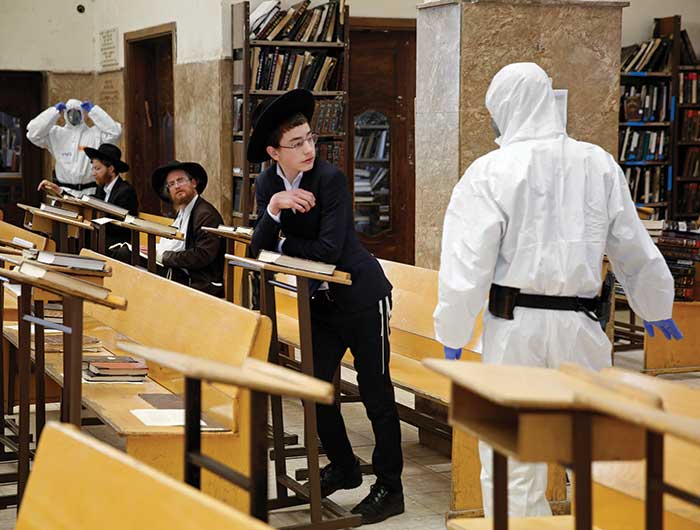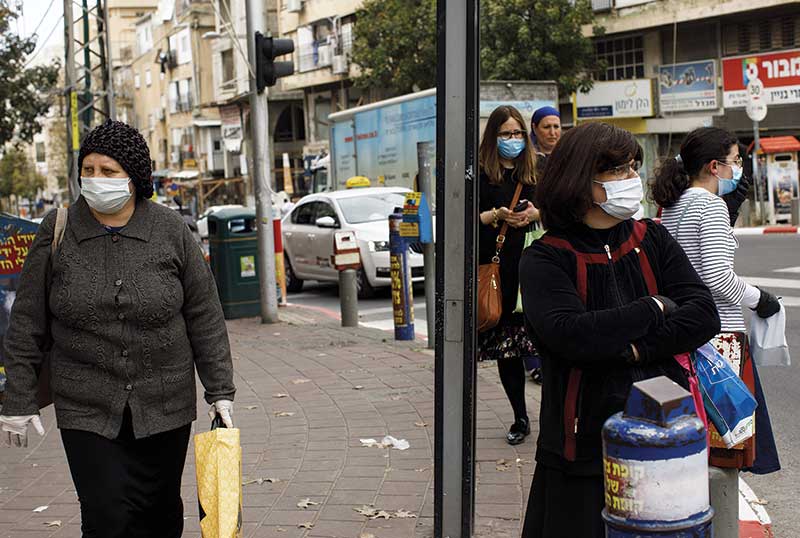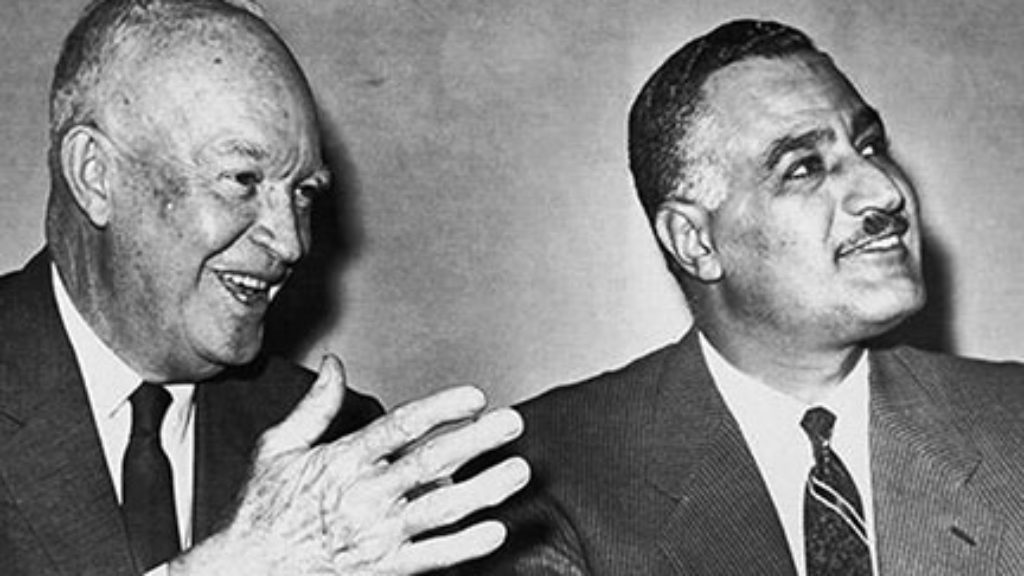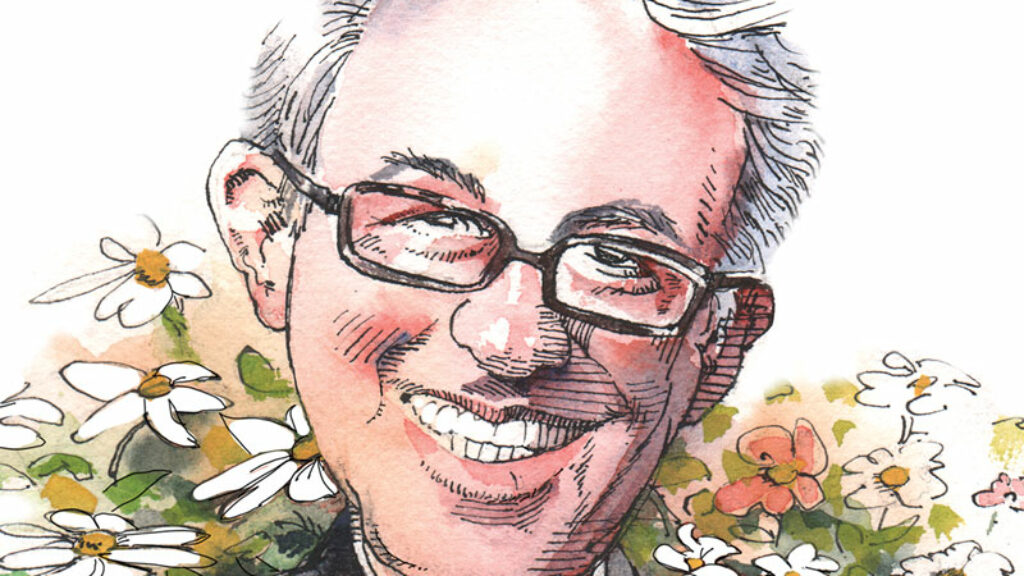Holiness and Public Policy: The Haredi Response to COVID-19
In May of this year, Israeli interior minister and Shas Party chief Aryeh Deri acknowledged that the great majority of Israeli citizens who had contracted COVID-19 were haredi:
Within our public, we need to do very deep soul-searching, unfortunately. Around 70 percent of the sick in the State of Israel, in the entire country, 70 percent of the sick are ultra-Orthodox.
Deri is right, but I haven’t noticed very much public soul-searching in the month since he spoke out. Moreover, it is not only our souls that we need to search but also our approach to public policy and our relationship with our fellow citizens. Before turning to the question of how and whether the haredi community—my own community—will change in the aftermath of its failure at the outset of the coronavirus pandemic, it’s worth underlining the scope of that failure.
On March 1, a week after the first Israeli citizen tested positive for COVID-19 (she had been on a cruise in Japan) and a day before Israeli elections, Rabbi Chaim Kanievsky was asked by his grandson whether voting for the United Torah Judaism (UTJ) slate would protect people from infection. Rabbi Kanievsky, a towering 92-year-old rabbinic scholar and among the preeminent haredi rabbinic authorities of this generation (the gedolei hador), said that it would. When Purim came the following week, there was no nationwide consensus on how it should or should not be celebrated that year, but several large Israeli celebrations were canceled; in haredi communities, it was celebrated with the same joyous abandon as every other year. The next day, when Prime Minister Netanyahu announced a ban on all school gatherings, Rabbi Kanievsky’s grandson asked him if haredischools should be closed. In a brief video that quickly went viral, Rabbi Kanievsky can be heard responding “Halila!” (roughly, “Heaven forbid!”), and they were kept open for the rest of the month. Meanwhile, a prominent haredi charity, Kupat Ha’ir, had launched a charity campaign in which those who donated more than 3,000 NIS were sent a “protective letter,” which would give them immunity from the virus. (As I write, in June, the campaign has been relaunched to protect donors from a second wave.)

By mid-March, with increased police enforcement, haredi institutions began to shut down, and compliance with government directives within the community increased, though extremist groups continued to ignore the restrictions. Later in the month, when tighter restrictions were announced, then–Health Minister Yaakov Litzman pleaded with Netanyahu to allow synagogues to remain open. Litzman heads Agudat Israel, one of the two parties that make up the UTJ. He would later be accused of flouting the rule himself and attending services. On April 2, he and his wife both tested positive for COVID-19. Other haredi political leaders were largely silent throughout this period.
The predominantly haredi city of Bnei Brak, where schools, yeshivot, and synagogues were kept open far too long, accounted for 16 percent of all Israeli
COVID-19 cases and a comparable percentage of fatalities despite only comprising about 2 percent of the Israeli population. This was true despite the fact that the population of Bnei Brak, like other haredi cities and neighborhoods, is exceedingly young—close to 60 percent of its population is under the age of 19—and COVID-19 fatalities occur disproportionately among the elderly. Although Israel has been among the most successful countries in its containment of the virus, keeping deaths down (so far) to 300, the haredi community, which now makes up 12.5 percent of its population, has, to say the least, not done its part. Will we change, and how?
Of course, haredi society is not a single uniform block. It is, in fact, a diverse and multifaceted society with a great variety of groups and subgroups, each with its own distinct social structure, ideology, and theology. Nonetheless, haredi society as a whole can be characterized by a broad set of shared characteristics. These include acceptance of strong rabbinic authority; commitment to Torah study as a paramount, defining value (and the concomitant lack of a leisure culture); a tense (at best) relationship with Zionism; strict halakhic standards; traditional gender roles (with the notable exception of women’s frequent role as breadwinners); and others. But the single foundation that enables the social realization of these values is isolation—high community walls that separate haredi society from the culture and values of the modern, Western world. To be haredi thus means to belong to a haredi community, separate from the rest of Israeli society.
This robust conception of community stands behind many norms common to haredi society—the distinctive dress code of each haredi group, the disposition to live in separate geographic neighborhoods, preservation of Yiddish among Hasidic communities, and so on. Asked “Who are you?” many haredim will answer “I am haredi,” while others will answer “I am a Vizhnitzer Hasid” or “I am a Belzer Hasid” or the like. Such responses will come before the simple “I am a Jew” or “I am a religious Jew,” let alone an individualist answer such as “I am Yehoshua Pfeffer.”
While such strong communal identification provides individuals with important social benefits—indeed, an identity—it was not conducive to an effective response to COVID-19 since it makes religious life—which is to say life—hard to conceive of in the absence of our communal institutions. The shul, the shtiebel, the yeshiva, the kollel, and the tisch, all of them face-to-face institutions,are the very foundations of haredi religious society. It was, thus, hardly surprising to find extremist haredi factions describing governmental closure edicts as “decrees against religion,” heightening the conflict between secular Zionism and the haredi world.
A few haredi commentators saw the spring quarantine as an opportunity to strengthen our individual service to God. One author noted that “our Judaism has for the most part become a matter of institutions” and asked us to “constitute religious lives outside of the institutions we have come to identify as religion itself.”For most haredi people, this was a lot—perhaps too much—to ask.
In certain significant respects, haredi society in Israel operates as a state within a state. (To some extent, this is even true in the diaspora; “Williamsburg,” Esty says in Unorthodox, “is not America.”) Of course, there is no haredi state with a monopoly on the use of force, control over infrastructure, government services, and so on. And yet, the social authority community leaders and institutions maintain over their members is extraordinary. Compliance with rabbinic authority is often regarded as the defining element of belonging to haredi society. As one commentator noted, a haredi person is “first and foremost somebody who has accepted upon himself the absolute authority of haredi rabbinic leadership.”
The scope of rabbinic authority changes from community to community. In some (mainly Hasidic) groups, haredi individuals will do little of significance, including such decisions as naming a child, buying a house, or getting a job, without consulting rabbinic authority. For others, decisions about certain matters remain in the private sphere. But in matters of public policy, the political-theological concept of da’at Torah (literally, “Torah knowledge”), which asserts rabbinic authority over even apparently secular matters, reigns. It is not often that state authority clashes directly with haredi rabbinic authority—haredi society has no real aspiration to self-sufficiency or full autonomy—but when it does, it is crystal clear that rabbinic authority prevails.
Thus, when the haredi rabbinic leadership decided to keep yeshiva institutions open in defiance of government regulations, one haredi author, a woman who admitted to falling below community standards in some respects, wrote that “there is nothing that calms me more than sending my son to yeshiva.” She questioned, “For what reason do we have a rabbinic leadership [gedolei yisroel] if not to heed their instruction as the only relevant opinion, since they see far beyond our everyday sight?”

The initial response of haredi leaders to the shutdown was to ask something like, “How can the closure of cinemas, theaters, and sports stadiums be compared with closing institutions of Torah and prayer?!” The familiar defense mechanisms that protect haredi institutions from outside interference were duly activated, and even internal calls for caution and deference to medical authority fell on deaf ears. Unfortunately, this line of thought took the “state within a state” mentality at least a step too far, obscuring or ignoring two basic facts. First, epidemiologically speaking, there is no difference between a movie theater and a yeshiva as a site for the transmission of COVID-19. Second, the control of the virus’s spread is necessarily a national matter, not one that can be dealt with piecemeal, community by community.
Coupled with these factors, Israel’s government, still in the midst of a year-long stalemate, failed to effectively prearrange the haredi response in collaboration with community leaders or to sufficiently invest resources in reaching the haredi public. The result was a disaster.
Haredi society often prides itself on living outside the natural ways of the world. In haredi parlance, families in which men refrain from working in favor of full-time Torah study are referred to as “those who eat the manna.” As one author wrote, “The fact that children of avrechim [full-time yeshiva students] own their own apartments and manage to feed large families is nothing but a true wonder—manna from the heavens!” This attitude extends to a range of phenomena, from avoiding all secular studies to an affinity for segulot (supernatural charms) and much beyond. To be fair, the remarkable and sustained growth of haredi society over the last seven decades is indeed something of a wonder—as are many aspects of modern Israel. But even wonders have their limitations.
At the onset of the COVID-19 crisis, the mantra “Torah protects and preserves!” was repeated time and again by a wide array of leading haredi figures as though this justified defying state regulations and continuing religious “business as usual.” Yet, Torah study alone does not negate the need to follow safety guidelines necessary for the protection of human life. To quote an essay published in the haredi journal Tzarich Iyun (which I edit), “No sane, God-fearing Jew insists that an ill person study Torah for a few extra hours instead of visiting a doctor.” The fact that this obvious analogy was not internalized early on indicates a disconnect from reality—how viruses work, the news of how COVID-19 spread in other countries, the impossibility of social distancing in schools and shuls—and a lack of awareness about the nature of public policy.
As late as April, a haredi Knesset member petitioned the government to exclude barbershops from the list of Israeli businesses required to curtail operations under social distancing rules to allow haredi men to get haircuts before Passover, since they are forbidden between Passover and Shavuot (or Lag BaOmer). In one haredi community, a notice advertised an amulet that would protect those continuing to pray in synagogues from the long arm of the Zionist police.
Ultimately, especially after disturbing images were circulated of haredi men and women whose bodies were awaiting burial in London and New York, haredi society fell in line. It had become clear that you cannot fight COVID-19 with slogans, that charity donations alone were not enough, and that the pandemic was not, in fact, a Zionist ploy to close yeshivas. But not before the damage was done.
As I write, in June, it would appear that haredi communities have, belatedly, become even more stringent than other parts of Israeli society in following national health guidelines. This is, no doubt, a good thing, but it does not address to the underlying weaknesses of the haredi world, which its response to the pandemic revealed.
Haredi society enables one to bring up one’s children in an island of tranquility, protected from the bombardment of popular culture and secularist ideology. It fosters an atmosphere of devotion to God, holy texts, and religious practice. It promotes a wholesome community life that consists of large and closely intertwined families, respect of youth for elders, and strong local communities that can pool resources for their common good. Many feel blessed to belong to haredi communities, and my family and I are among them.
But, of course, strong communities can stifle individuals. This becomes more troubling when local and even national politics are intertwined with community authority, creating a system in which conformity is imposed by government-funded institutions. Moreover, communal autonomy, especially when combined with religious fervor, can generate a collective arrogance, a holier-than-thou attitude that breeds a sense of privilege and eliminates the concept of the broader good. And isolation can lead to a detachment from reality—a detachment that, at moments of truth, such as the present pandemic, can be dangerous.
Public policy is the Achilles’ heel of haredi society, and COVID-19 exposed it. In a recent radio interview, the interviewer asked Yaakov Litzman, who is now Minister of Housing and Construction, how the country would be run if haredi society became the majority. His answer was as telling as it was evasive: “We will never be a majority.” It could indeed be that we will never be a majority. But, if our vision of the common good ends at the borders of our own community, then we do ourselves a double disservice—first, because, in certain matters, such as that of COVID-19, the distinctions between “us” and “them” fall away—or, at any rate, should—and we are collectively called to think through and implement public policy. But secondly, and perhaps more fundamentally, in failing to see beyond our community’s borders, we lose a central element of Judaism.
Before the revelation at Sinai, God instructed Moses to tell the Children of Israel that “you shall be unto me a kingdom of priests and a holy nation” (Ex. 19:6). Elsewhere, the great medieval commentator Nachmanides understands the biblical exhortation for Israel to be holy as “you shall be separate.” Haredi society collectively espouses this concept of holiness-as-separateness as its defining value. Yet, there is another concept of holiness that the Torah expects from the Jewish people, articulated most clearly in Moses’s first speech in Deuteronomy:
See, I have imparted to you laws and rules, as the LORD my God has commanded me, for you to abide by in the land you are about to enter and possess. Observe them faithfully, for that will be proof of your wisdom and discernment to other peoples, who on hearing of all these laws will say, “Surely, that great nation is a wise and discerning people.” For what great nation is there that has a god as close at hand as is the LORD our God whenever we call upon Him? Or what great nation has laws and rules as perfect as all this Teaching that I set before you this day?” (Deut. 4: 5–8)
Being holy requires a degree of separation, but, concomitantly, it calls us to deep involvement in the world. We are holy precisely when other nations look at us and declare, “Surely, that great nation is a wise and discerning people.” As Maimonides repeatedly argues, the purpose of the commandments is “to perfect us and to rectify the affairs of our society.”
In this sense, one cannot be holy without involvement in public policy. An entirely reclusive society cannot be a model for others—Jews or non-Jews—to emulate. If it fails to take affairs beyond its own borders into consideration, haredi society cannot be a model of a “wise and understanding people.” Certainly, our response to the coronavirus pandemic fell short of that mark.
As it continues to grow, haredi society will inevitably become more and more enmeshed in Israeli social and political life, and a process of increasing engagement and involvement at every level of society is already very much in motion. (Among other things, Internet usage in haredi households has skyrocketed during the shutdown.) The need of the hour is to devise and formulate a haredi model for public policy, one that will incorporate the second meaning of holiness without compromising the first.
When Rabbi Gershon Edelstein, the rosh yeshiva of Ponevezh, the preeminent yeshiva in Bnei Brak, was asked why COVID-19 had hit the haredi community harder than the rest of Israel, he answered that it was a punishment for sin:
In our times, those that never studied Torah and have not returned [i.e., nonreligious groups in Israel]—when they transgress, they are considered shogeg [unintentional sinners]. They are tinokos shenishbu [in the category of Jewish children who grew up in Gentile captivity]. They are not at fault; they never had any education. But a haredi person? A haredi person who transgresses is not a shogeg! Therefore, midas hadin [the divine attribute of justice] is harsher concerning haredi individuals. This has been apparent even abroad.
Rabbi Edelstein was one of the senior leaders who demonstrated deep resolve in ensuring compliance with government directives, going significantly further than his colleagues and even preempting a rabbinic proclamation that might have led to laxity in compliance. However, while Rabbi Edelstein’s response was an important call to spiritual self-reflection for his many listeners, it had no practical component, and it provided no guidance for our response to the next public crisis.
As the Talmud points out in several places, our analysis of human affairs must include an earthly component as well as a spiritual one. If the haredi community is to learn from its failures during the COVID-19 crisis and live up to its own goal of exemplifying what it is to be a holy nation, then it must develop an approach to public policy that addresses all of its fellow citizens.
Editor’s Note: Frequent JRB contributor Yossi Shain responded along with philanthropist Daniel Goldman to this article, and Yehoshua Pfeffer penned a final rejoinder.
Suggested Reading

Ike’s Bet and Nasser’s Vasser
Could the hot dog-munching, movie-going young colonel named Nasser have become our man if we had tried harder to accommodate him at the very outset?
Seeds of Subversion
The "Other" Jewish tradition.

“He Called Me Jim”
In his autobiography, James Atlas explores how and why he spent his professional life living with and overshadowed by complex, overweening literary giants.

Patriotism and Its Discontents
While many Jews embraced the Russian revolutionary cause from the very beginning—four of the seven members of the first Bolshevik Politburo were Jews—the revolution did not embrace them for long.
Comments
You must log in to comment Log In